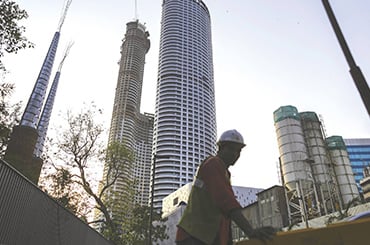-
Audit approach overview
Our audit approach will allow our client's accounting personnel to make the maximum contribution to the audit effort without compromising their ongoing responsibilities
-
Annual and short period audit
At P&A Grant Thornton, we provide annual and short period financial statement audit services that go beyond the normal expectations of our clients. We believe strongly that our best work comes from combining outstanding technical expertise, knowledge and ability with exceptional client-focused service.
-
Review engagement
A review involves limited investigation with a narrower scope than an audit, and is undertaken for the purpose of providing limited assurance that the management’s representations are in accordance with identified financial reporting standards. Our professionals recognize that in order to conduct a quality financial statement review, it is important to look beyond the accounting entries to the underlying activities and operations that give rise to them.
-
Other Related Services
We make it a point to keep our clients abreast of the developments and updates relating to the growing complexities in the accounting world. We offer seminars and trainings on audit- and tax-related matters, such as updates on Accounting Standards, new pronouncements and Bureau of Internal Revenue (BIR) issuances, as well as other developments that affect our clients’ businesses.
-
Tax advisory
With our knowledge of tax laws and audit procedures, we help safeguard the substantive and procedural rights of taxpayers and prevent unwarranted assessments.
-
Tax compliance
We aim to minimize the impact of taxation, enabling you to maximize your potential savings and to expand your business.
-
Corporate services
For clients that want to do business in the Philippines, we assist in determining the appropriate and tax-efficient operating business or investment vehicle and structure to address the objectives of the investor, as well as related incorporation issues.
-
Tax education and advocacy
Our advocacy work focuses on clarifying the interpretation of laws and regulations, suggesting measures to increasingly ease tax compliance, and protecting taxpayer’s rights.
-
Business risk services
Our business risk services cover a wide range of solutions that assist you in identifying, addressing and monitoring risks in your business. Such solutions include external quality assessments of your Internal Audit activities' conformance with standards as well as evaluating its readiness for such an external assessment.
-
Business consulting services
Our business consulting services are aimed at addressing concerns in your operations, processes and systems. Using our extensive knowledge of various industries, we can take a close look at your business processes as we create solutions that can help you mitigate risks to meet your objectives, promote efficiency, and beef up controls.
-
Transaction services
Transaction advisory includes all of our services specifically directed at assisting in investment, mergers and acquisitions, and financing transactions between and among businesses, lenders and governments. Such services include, among others, due diligence reviews, project feasibility studies, financial modelling, model audits and valuation.
-
Forensic advisory
Our forensic advisory services include assessing your vulnerability to fraud and identifying fraud risk factors, and recommending practical solutions to eliminate the gaps. We also provide investigative services to detect and quantify fraud and corruption and to trace assets and data that may have been lost in a fraud event.
-
Cyber advisory
Our focus is to help you identify and manage the cyber risks you might be facing within your organization. Our team can provide detailed, actionable insight that incorporates industry best practices and standards to strengthen your cybersecurity position and help you make informed decisions.
-
ProActive Hotline
Providing support in preventing and detecting fraud by creating a safe and secure whistleblowing system to promote integrity and honesty in the organisation.
-
Accounting services
At P&A Grant Thornton, we handle accounting services for several companies from a wide range of industries. Our approach is highly flexible. You may opt to outsource all your accounting functions, or pass on to us choice activities.
-
Staff augmentation services
We offer Staff Augmentation services where our staff, under the direction and supervision of the company’s officers, perform accounting and accounting-related work.
-
Payroll Processing
Payroll processing services are provided by P&A Grant Thornton Outsourcing Inc. More and more companies are beginning to realize the benefits of outsourcing their noncore activities, and the first to be outsourced is usually the payroll function. Payroll is easy to carve out from the rest of the business since it is usually independent of the other activities or functions within the Accounting Department.
-
Our values
Grant Thornton prides itself on being a values-driven organisation and we have more than 38,500 people in over 130 countries who are passionately committed to these values.
-
Global culture
Our people tell us that our global culture is one of the biggest attractions of a career with Grant Thornton.
-
Learning & development
At Grant Thornton we believe learning and development opportunities allow you to perform at your best every day. And when you are at your best, we are the best at serving our clients
-
Global talent mobility
One of the biggest attractions of a career with Grant Thornton is the opportunity to work on cross-border projects all over the world.
-
Diversity
Diversity helps us meet the demands of a changing world. We value the fact that our people come from all walks of life and that this diversity of experience and perspective makes our organisation stronger as a result.
-
In the community
Many Grant Thornton member firms provide a range of inspirational and generous services to the communities they serve.
-
Behind the Numbers: People of P&A Grant Thornton
Discover the inspiring stories of the individuals who make up our vibrant community. From seasoned veterans to fresh faces, the Purple Tribe is a diverse team united by a shared passion.
-
Fresh Graduates
Fresh Graduates
-
Students
Whether you are starting your career as a graduate or school leaver, P&A Grant Thornton can give you a flying start. We are ambitious. Take the fact that we’re the world’s fastest-growing global accountancy organisation. For our people, that means access to a global organisation and the chance to collaborate with more than 40,000 colleagues around the world. And potentially work in different countries and experience other cultures.
-
Experienced hires
P&A Grant Thornton offers something you can't find anywhere else. This is the opportunity to develop your ideas and thinking while having your efforts recognised from day one. We value the skills and knowledge you bring to Grant Thornton as an experienced professional and look forward to supporting you as you grow you career with our organisation.
As the holiday season draws near, it provides an ideal moment to examine the tax exemptions and privileges available to businesses in the real estate sector under the Philippine Tax Code. These statutory benefits, specifically designed to support the real estate industry, are primarily in the form of value-added tax (VAT) exemptions, income tax holidays, and other related fiscal incentives. For real estate transactions, understanding the distinction between ordinary and capital assets is critical, as it determines whether VAT applies. The Tax Code, under Section 109, outlines several key exemptions for real property transactions, which we will explore in detail.
VAT exemption on the sale of capital assets
Under Section 109(P) of the Tax Code, the sale of real properties not primarily held for sale or lease in the ordinary course of trade or business is exempt from VAT. This applies to real properties classified as capital assets—those that are not intended for sale or use in a business.
For a real property to qualify as a capital asset, it must not be part of the seller's regular business activities, such as trading or leasing real estate. The classification of the real property as a capital or ordinary asset depends on the nature of the taxpayer's business and whether such property is used in trade or business of the taxpayer. For example, if the seller is a real estate dealer, developer, or lessor, the property is classified as an ordinary asset, and the sale of such is typically subject to VAT at 12%. However, if the seller is not engaged in real estate business, such as a non-dealer company that holds a property for investment purposes, the sale of such property may qualify for VAT exemption.
The Bureau of Internal Revenue (BIR) has provided further clarity on this point through Revenue Regulations (RR) No. 7-2003, which allows the reclassification of properties from ordinary to capital assets if the property has been idle for more than two years. A recent BIR ruling in 2023 demonstrates this principle, where a non-real estate business was able to reclassify its property as a capital asset and exempt it from VAT after showing that the property had not been used for trade or business for over two years. Specifically, the taxpayer presented the following proof.
i. The taxpayer is not engaged in real estate business as shown in its Articles of Incorporation.
ii. Its Audited Financial Statement (AFS) shows that the subject properties were neither included in its inventory held nor owned primarily for sale in the ordinary course of its trade or business from the time of their acquisition. Also, the same has not been subjected to the allowance for depreciation provided for under Sec. 34(F) of the Tax Code of 1997, as amended. In support thereof, the subject properties were certified as idle by the Office of the Punong Barangay where it is located and have been found to have no improvements as confirmed in the certification issued by the Office of the Assessor.
iii. The AFS showed no revenue from any of the subject properties held from the time that they were acquired. The subject properties were never used for lease/rent or being offered for lease/or rent.
With the foregoing factual milieu, the BIR opined that the sale of the said properties is subject to capital gains tax and documentary stamp tax but not subject to VAT and creditable withholding tax.
VAT exemption on low-cost and socialized housing
The sale of real properties used for low-cost and socialized housing enjoys VAT exemption under the provisions of the Urban Development and Housing Act (RA 7279). As defined by the law and supported by Revenue Regulations (RR) No. 13-2018, low-cost housing refers to projects designed for low-income families, while socialized housing covers housing for the underprivileged and homeless citizens.
Under the Joint Memorandum Circular No. 2024-001, both the Department of Human Settlements and Urban Development (DHSUD) and the National Economic and Development Authority (NEDA) have set specific price ceilings for socialized and low-cost housing projects. These ceilings range from P300,000 for socialized housing to up to P3 million for low-cost housing units. Developers of these housing projects are entitled to VAT exemption, and the sale of property to qualified beneficiaries is also exempt from income tax and creditable withholding tax.
Income Tax Holiday for socialized housing developers
Developers of socialized and low-cost housing can avail themselves of the Income Tax Holiday (ITH) by registering with the Board of Investments (BOI). In 2023, the BOI amended the 2022 Strategic Investment Priority Plan (SIPP) to include low-cost housing projects with a selling price of up to P3 million. This amendment opens the door for more developers to benefit from ITH, which are granted for a period starting from the project’s Start of Commercial Operations (SCO).
Under the CREATE MORE Act (RA No. 12066), domestic market enterprises duly registered with the BOI can avail of the ITH for a period of four (4) to seven (7) years, followed by the Enhanced Deduction Regime (EDR) for ten (10) years, or EDR for a maximum period of fourteen (14) to seventeen (17) years, depending on location and industry priorities.
The SIPP also mandates that at least 20% of the project’s area and floor space be dedicated to socialized housing. Once a project is registered with the BOI, it may be exempt from corporate income tax during the ITH period, and the developer is also exempt from creditable withholding tax.
Upon BOI registration, the terms of entitlement shall be specified in the registration agreement and/or standard terms and conditions. For income tax purposes, the ITH shall commence following the SCO. As the real estate developer is not subject to income tax, it follows that the creditable withholding tax (CWT) is inapplicable to their income. In this case, a BIR ruling shall be applied to confirm the exemption from creditable withholding tax during the ITH period pursuant to the provisions under RMO No. 9-2014 and RR No. 2-98, as amended. Thereafter, the duly issued affirmative ruling or certificate of tax exemption (CTE) shall then be issued to the buyers or clients of the real estate developer as proof of its exemption from CWT.
VAT exemption on residential properties sold for P3.6 million or less
As of January 1, 2024, a new VAT exemption applies to the sale of residential units—such as house and lot packages, condominium units, and other residential dwellings—valued at P3.6 million or below, as outlined in RR No. 1-2024. To qualify for this exemption, the property must be used for residential purposes. Importantly, if multiple adjacent properties are sold to the same buyer with the intent to be used as a single residential area, they will still be considered VAT-exempt as long as the aggregate value does not exceed P3.6 million.
However, this exemption does not extend to parking lots, even if sold together with a condominium unit, as the sale of parking spaces is considered a separate transaction and remains subject to VAT.
VAT exemption on residential lease agreements
For real estate lessors, the lease of residential units with a monthly rental of P15,000 or less is VAT-exempt. This includes apartments, houses, dormitories, and other similar residential properties. Notably, the exemption applies even if the total annual rental payments exceed the VAT threshold of P3 million, as long as the individual monthly rent does not exceed P15,000.
"Residential Units" shall also include apartments, houses, buildings, parts, or units thereof used for home industries, retail stores, or other business purposes if the owner thereof and his family actually live therein and use them principally for dwelling purposes.
Essentially, this exemption applies if the following conditions apply, namely: a lease transaction involving residential units and the monthly lease not exceeding P15,000.
The lessor must issue a non-VAT invoice for such leases, ensuring that they do not charge VAT to their tenants. This exemption provides relief for lessors of low-cost housing and other affordable residential units.
Key Takeaways
Tax exemptions and incentives are critical tools for fostering growth in the real estate sector, particularly for developers focused on low-cost and socialized housing. However, real estate businesses must be diligent in ensuring that they meet the specific requirements set forth by the tax authorities and Investment Promotion Agency.
It is important to note that tax exemptions are strictly construed against the taxpayer. Businesses must demonstrate their eligibility for these exemptions with clear, substantiated evidence. Exemptions are not automatically granted, and taxpayers bear the burden of proof.
The BIR’s recent push for clearer guidelines and regular issuance of clarificatory circulars is a positive step, helping businesses navigate the complexities of tax laws. As the year draws to a close, it is an opportune time for real estate businesses to review their tax compliance and take advantage of the exemptions available under the law, while ensuring they are fully compliant with the relevant regulations.
In this season of giving, many businesses in the real estate sector continue to benefit from these incentives while contributing to the economy and society. Likewise, it is hoped that the BIR will continue its efforts to simplify processes and support businesses in achieving sustainable growth.
As published in BusinessWorld, dated 03 December 2024




